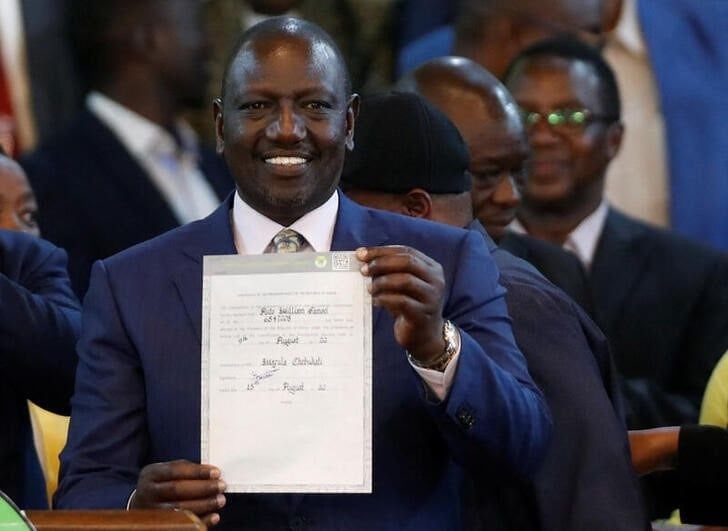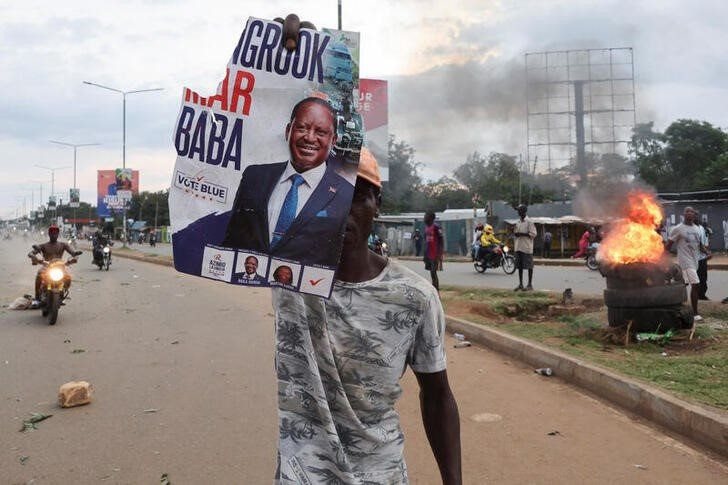
Top stories




ESG & Sustainability#BudgetSpeech2026: SRD grant unchanged, other Sassa social grants see hike
4 hours


More news











ESG & Sustainability
South Africa’s carbon tax should stay: climate scientists explain why











In the western city of Kisumu and Nairobi's huge Kibera slum, both strongholds of rival candidate Raila Odinga, calm returned to the streets after protesters battled police and burned tyres on the road overnight.
The dramatic events of Monday, which saw Ruto declared president by a tiny margin as a split emerged in the electoral commission overseeing the 9 August vote, has raised fears of bloody violence like that seen after previous disputed polls.
Odinga's Azimio La Umoja (Declaration of Unity) Alliance is expected to hold a news conference on Tuesday to give its verdict on the election outcome and chart the way forward.
The veteran opposition leader, making his fifth bid for the presidency, was under local and international pressure to seek peaceful legal remedy for any concerns over the election outcome. The United Nations and the US embassy in Kenya both urged all parties to work together.
The four commissioners who disowned the election results also said the parties should seek resolution through the courts.
Kenya, East Africa's richest and most stable nation, has a history of post-election bloodshed, with over 1,200 people killed in widespread violence after the 2007 presidential vote. More than 100 people were killed in 2017 after the Supreme Court overturned the result due to anomalies in the voting process.
Odinga supporters have denounced Monday's election result although Kisumu Governor Anyang' Nyong'o called for calm as protests in parts of the lakeside town turned violent after Ruto's victory was declared. He said the Azimio leadership was working to plan its response to "ensure justice" for Odinga.
Neither the chairman of the electoral commission, Wafula Chebukati, who declared Ruto the winner with 50.49% of the vote against Odinga's 48.5%, nor the four commissioners who disowned the results responded to a Reuters request for comment.

Ruto, the current deputy president and head of the Kenya Kwanza (Kenya First) Alliance, had appeared to be leading Odinga as Kenyans awaited final results of the election.
Once in office, he will have to confront an economic and social crisis. Poor Kenyans already reeling from the impact of Covid-19 have been hit by global rises in food and fuel prices while a devastating drought in the north has left 4.1 million people dependent on food aid.
The 55-year-old had made Kenya's class divisions the centrepiece of his campaign to become Kenya's fifth president, promising to reward low-income "hustlers."
In Kisumu, the mood was subdued, with many shops shuttered and roads dotted with large stones and marks from burned tyres.
Some residents said they were waiting for Odinga's signal.
Nancy Achieng arrived on Tuesday morning to find the wooden stall from which she sold foods at the side of the road in the Kondele neighbourhood destroyed.
"I've lost the election and I've also lost my business," said Achieng, who had been selling beans, chapati and roasted maize there for two years. "I don't even know where I'm going to get the cash from (to rebuild)."
Across the road stood a supermarket with its windows broken.
Achieng said she might protest on Tuesday, depending on what sort of statement Odinga and his party made.
"We need him to speak soon ... there is a lot of anxiety," she said.

Reuters, the news and media division of Thomson Reuters, is the world's largest multimedia news provider, reaching billions of people worldwide every day.
Go to: https://www.reuters.com/